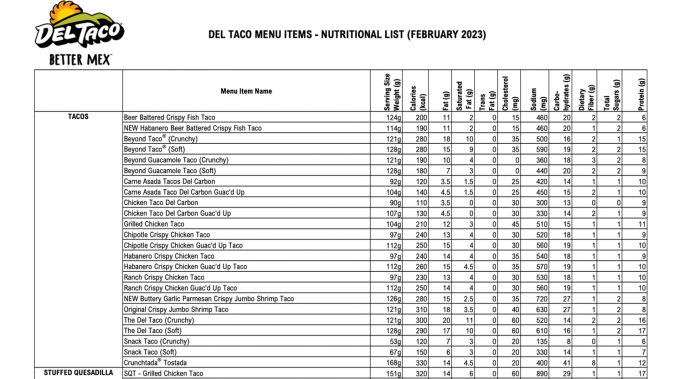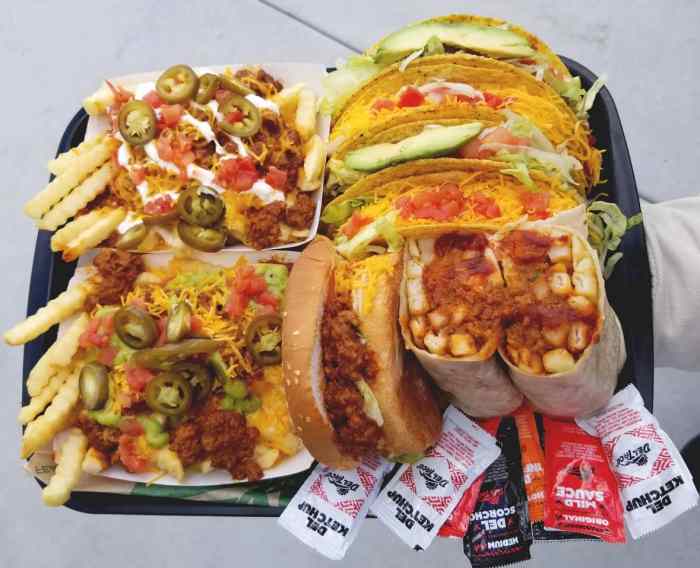Ingredient Analysis: Del Taco Nutrition Facts

Del taco nutrition facts – Del Taco’s menu, a vibrant tapestry of Mexican-inspired flavors, relies on a blend of familiar and sometimes unexpected ingredients. Understanding these components and their impact on the nutritional profile of their popular dishes is key to making informed choices. This analysis delves into the key ingredients, their sourcing, processing, and potential nutritional consequences, alongside an overview of common allergens and their handling.
The nutritional impact of Del Taco’s food is directly tied to the ingredients used. Popular items like their signature tacos, burritos, and bowls often feature a base of seasoned beef or chicken, beans, rice, cheese, lettuce, and various sauces. The quality and processing of these ingredients play a significant role in the overall nutritional value. For example, the type of fat used in cooking the meat, the sodium content of the seasoning, and the type of cheese used all contribute to the final nutritional profile.
Key Ingredients and Nutritional Impact, Del taco nutrition facts
Del Taco’s most popular items frequently include beef, chicken, beans, rice, cheese, and various sauces. The nutritional impact varies significantly depending on the specific item and portion size. For instance, leaner cuts of beef or chicken will generally result in a lower fat and calorie count compared to richer options. Similarly, the type of beans used (black beans versus pinto beans) will affect the fiber and protein content.
The use of whole grains in rice would positively impact fiber intake, while processed cheeses tend to be higher in saturated fat and sodium. The sauces, often containing added sugars and fats, significantly influence the calorie and carbohydrate content.
Ingredient Sourcing and Processing
The sourcing and processing of ingredients have a direct effect on the nutritional quality of the final product. While Del Taco doesn’t publicly detail the specific sourcing of all its ingredients, the general industry practices suggest that many of their ingredients undergo significant processing. For example, the beef may be sourced from large-scale agricultural operations, potentially impacting the overall nutritional quality depending on the animal’s feed and rearing conditions.
Processed cheeses often contain additives to enhance flavor and texture, potentially impacting their nutritional value. Similarly, the processing of rice and beans can affect their nutrient retention. The use of fresh versus frozen vegetables also affects nutritional content, with fresh vegetables generally retaining more nutrients.
Common Allergens and Handling
Del Taco’s menu items contain several common allergens, including milk, eggs, soy, wheat, peanuts, tree nuts, fish, and shellfish. The company is legally obligated to clearly label menu items containing these allergens. However, cross-contamination during food preparation is a possibility in any restaurant setting. Del Taco’s procedures for allergen handling vary by location and are subject to change.
Customers with severe allergies should always inform staff about their needs and exercise caution when ordering. It is recommended to confirm preparation practices directly with the restaurant staff, as they can offer the most up-to-date information about their allergen handling procedures. This highlights the importance of careful communication and awareness for customers with allergies.
Analyzing Del Taco nutrition facts reveals a high calorie and sodium content, often reflecting the fast-food nature of their offerings. For those seeking healthier alternatives, understanding the nutritional profile of ingredients like almond flour becomes crucial; a resource such as almond flour nutrition facts can inform healthier recipe choices. This knowledge can then be applied to creating lower-calorie, higher-protein meals to contrast with the Del Taco menu.
Nutritional Label Analysis

Del Taco’s nutritional information, a cornerstone of informed consumer choices, presents both strengths and areas ripe for enhancement. A thorough analysis reveals opportunities to improve clarity, accessibility, and consistency across various platforms, ultimately empowering customers to make healthier and more informed decisions about their meals. This analysis delves into specific aspects of their current labeling and offers concrete suggestions for improvement.
A comprehensive review of Del Taco’s nutritional data, available both in-store and online, reveals a generally accessible format. However, inconsistencies exist between the online database and printed materials, sometimes leading to discrepancies in calorie counts or ingredient listings. This inconsistency can be frustrating for customers who rely on online information for dietary planning. Furthermore, the presentation of nutritional information could benefit from improved visual clarity and simpler language, particularly regarding the breakdown of macronutrients and micronutrients.
Many customers may find the technical language used challenging to understand without prior nutritional knowledge.
Inconsistencies in Nutritional Information
Discrepancies between online and printed nutritional labels create a lack of trust and can undermine consumer confidence. For example, a specific Del Taco item might show a slightly different calorie count on the website compared to the packaging in-store. These seemingly minor differences can significantly impact an individual’s daily calorie intake calculations, especially for those meticulously tracking their nutrition.
To rectify this, Del Taco should implement a robust quality control system to ensure complete synchronization across all platforms where nutritional information is displayed. Regular audits and cross-verification procedures would be essential to maintaining data accuracy and integrity.
Recommendations for Improving Clarity and Accessibility
To enhance the clarity and accessibility of their nutritional information, Del Taco could adopt several strategic improvements. The use of visual aids, such as color-coded charts or infographics, could make complex nutritional data more easily digestible for consumers. Simplifying the language used, replacing technical terms with easily understood equivalents, would greatly improve accessibility. For example, instead of listing “total fat,” they could use “fat,” and similarly simplify terms like “saturated fat” and “trans fat”.
A clear visual representation of the percentage of daily recommended values for key nutrients (like sodium, fat, and fiber) would further enhance consumer understanding.
Sample Nutritional Label for a Hypothetical Del Taco Menu Item
To illustrate the suggested improvements, consider a hypothetical Del Taco menu item, the “Spicy Chicken Avocado Bowl.” The following sample label demonstrates a more user-friendly and visually appealing approach to presenting nutritional information. This example prioritizes clarity and uses plain language to communicate the nutritional content effectively.
| Nutrient | Amount Per Serving | % Daily Value* |
|---|---|---|
| Calories | 450 | 22% |
| Total Fat | 20g | 25% |
| Saturated Fat | 5g | 25% |
| Cholesterol | 75mg | 25% |
| Sodium | 800mg | 33% |
| Total Carbohydrate | 50g | 17% |
| Dietary Fiber | 8g | 32% |
| Sugars | 10g | – |
| Protein | 30g | – |
| *Percent Daily Values are based on a 2,000 calorie diet. Your daily values may be higher or lower depending on your calorie needs. | ||
Top FAQs
Does Del Taco offer vegetarian options?
Yes, Del Taco offers several vegetarian options, including bean burritos and veggie tacos. However, always double-check ingredients for potential cross-contamination.
Are Del Taco’s menu items generally high in sodium?
Many fast-food items, including those at Del Taco, tend to be high in sodium. Be mindful of your sodium intake and consider choosing lower-sodium options or smaller portions.
Where can I find the most accurate Del Taco nutrition information?
The most accurate and up-to-date nutritional information can be found on Del Taco’s official website or on the nutritional labels of their packaging.
Does Del Taco accommodate gluten-free diets?
Del Taco offers some gluten-free options, but cross-contamination is a possibility. It’s crucial to inform staff of your dietary needs and check ingredient lists carefully.

